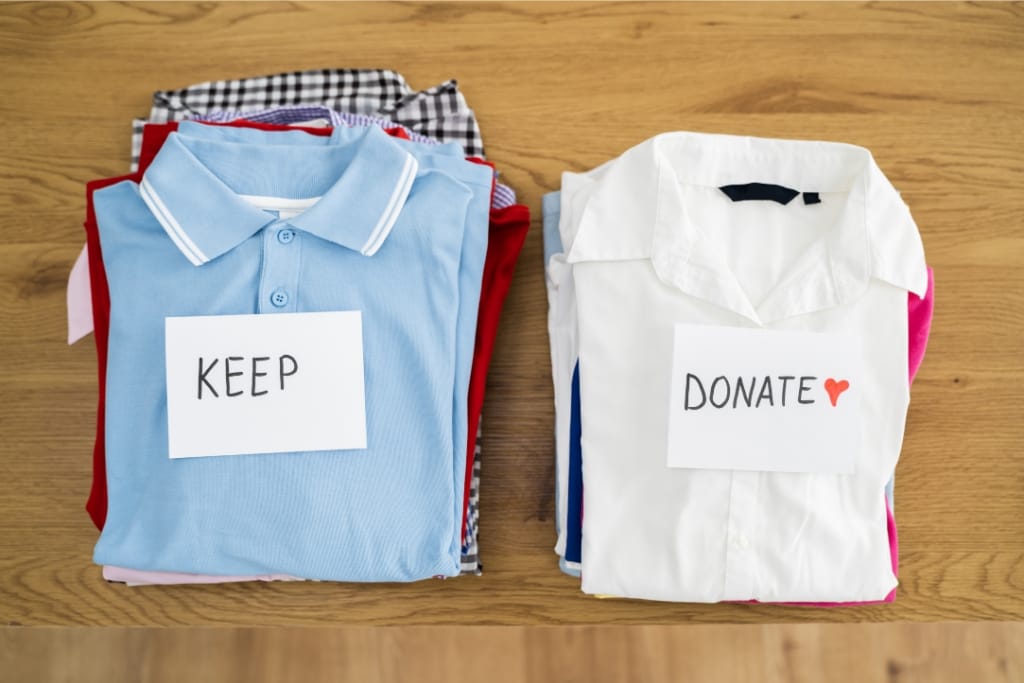Moving to a new home can be both exciting and daunting. It's a fresh start and the beginning of a new chapter in your life, but it also comes with the task of packing up your belongings and deciding what to keep and what to leave behind.
To make the process smoother, it's essential to declutter your home and leave behind things that you no longer need.
So, whether you’re moving locally or long distance, here are 10 things to get rid of when you move.
1)) Unused Clothes
One of the biggest clutter offenders is clothes. Most people have items in their wardrobe that they haven't worn in a year or more.
When it comes to moving, it makes sense to get rid of any clothes that no longer fit, are outdated, or are of no use to you.
3 Best Practices To Help Declutter:
- Create a Sorting System: Categorize your clothes into three batches: keep, donate, and toss. Clothes that are still in good condition but no longer fit or are no longer your style can be donated, while worn-out items should be tossed.
- Use the One-Year Rule: If you haven't worn an item in the last year, it's time to let it go. This rule helps you identify pieces in your wardrobe that, while you may like them, you don't wear.
- Host a Clothing Swap: Invite friends and family to a clothing swap. This is a fun and social way to declutter your wardrobe. You'll be able to get rid of items you no longer need and may even find new treasures from others' unused clothes.
Dealing with unused clothes effectively is vital for a smoother moving process.
By implementing a sorting system, abiding by the one-year rule, and possibly hosting a clothing swap, you can declutter your wardrobe efficiently.
Not only does this lighten your load during the move, but it also paves the way for a more organized and spacious closet in your new home.
2)) Outdated Electronics
Moving is the perfect time to get rid of old electronics that no longer serve you.
Take inventory of all your electronics and make a list of anything that hasn't been used in the past year or that has been replaced with an upgraded version.
Tips To Help Your Purge Electronics:
- Recycle Responsibly: Many electronics contain materials that can be harmful to the environment if not disposed of properly. Look for certified electronic recycling centers in your area where these items can be safely disposed of.
- Sell or Donate: If your old electronics are still functional, consider selling them online, or donating them to schools, charities, or individuals who may find them useful.
- Data Security: Before disposing of any electronics, ensure to erase all personal information stored on these devices to prevent potential data breaches. Back up important files, then perform a factory reset to remove all data.
Managing outdated electronics during a move involves a mindful approach to disposal, potential donation, and data security.
Recycling responsibly helps to mitigate environmental harm while selling or donating your old devices can aid those in need.
Prioritize data security to prevent any unwelcome surprises.
This way, you can move into your new home with a lighter load, free from old electronics that no longer serve you.
3)) Expired Medicine
It’s easy to forget about expired medication, but it can take up space and be dangerous in case of emergency.
Before moving, go through all your medicine, including vitamins and supplements, and dispose of any expired or unwanted items.
Tips To Help You Sort Medication:
- Check Expiry Dates Regularly: Make it a habit to check the expiry dates on all your medications, vitamins, and supplements on a regular basis. This ensures you're aware of what is nearing its expiry date and can be disposed of, helping avoid accidental consumption.
- Proper Disposal: Avoid flushing expired medication down the toilet or throwing it in the trash, as it can contaminate the water supply and environment. Instead, take them to a local pharmacy or participate in a medicine take-back program for safe disposal.
- Keep a Medicine Inventory: Maintain an inventory of all the medications in your home. It helps track what you have when they expire, and when it's time to replenish, ensuring you're not caught off-guard during the moving process.
Addressing the issue of expired medicine before a move can help ensure your health and safety while freeing up much-needed space.
Regular checks of expiry dates, proper disposal of expired items, and maintaining a current medicine inventory are all effective strategies.
By taking these steps, you can move with confidence, knowing that all medicines in your new home are safe, up-to-date, and ready to use when needed.
4)) Old Appliances
Appliances that are no longer useful or past their prime can be sold, donated, or recycled.
This way, you can avoid moving heavy or bulky appliances that take up a lot of space and potentially cost you money.
Tips For Dealing With Old Appliances:
- Assess Functionality: Evaluate the condition of your old appliances. If they are not working optimally or are significantly outdated, it might be time to consider upgrading.
- Sell, Donate, or Recycle: If your old appliances are still in working condition, consider selling them online or donating them to a charity. For appliances that are no longer functional, find a local recycling facility that accepts these items.
- Consider Replacement Costs: When deciding whether to keep or get rid of an old appliance, consider the cost of moving and installing it in your new home versus the cost of buying a new one. This will help you make an informed decision.
Sorting through old appliances as part of your move allows you to eliminate unnecessary bulk and potentially save on moving costs.
Assessing each appliance's functionality, considering selling, donating, or recycling options, and weighing replacement costs against moving and installation expenses are key steps in this process.
In doing so, you ensure that your new living space accommodates only the most necessary and efficient appliances, setting the foundation for an organized and clutter-free home.
5)) Duplicate Items
Duplicates are another thing to declutter before moving. Check your kitchen, bathroom, and storage spaces for multiple versions of the same item.
Keeping only the best one will help free up some space.
Tips To Help With Duplicate Items:
- Identify and Sort: The first step is to identify all duplicate items in your home. This includes everything from kitchen appliances to books and clothing. Once identified, sort them based on their condition and necessity.
- Pick the Best: Choose the item in the best condition or the one you use most frequently to keep. If there's no significant difference in condition or use, keep the one that holds the most sentimental value.
- Dispose Responsibly: For the duplicate items you decide to part with, consider selling, donating, or recycling them. This not only helps declutter your home before moving but also ensures the items are responsibly disposed of.
Effectively managing duplicate items prior to relocation allows for a more streamlined and efficient move.
By identifying and sorting duplicates, keeping only the best or most meaningful item, and responsibly disposing of the rest, you minimize clutter and maximize space in your new home.
This ensures a smooth transition and a fresh start without unnecessary burden.
6)) Damaged Furniture
Damaged furniture takes up space and may not even be able to function properly. If furniture needs more work than it is worth, it’s best to leave it behind.
Tips To Help With Determining How To Handle Damaged Furniture:
- Evaluate Condition: Take the time to thoroughly assess the condition of your furniture. If it's structurally unsound or requires extensive repairs, it might be best to leave it behind.
- Consider Repair Costs vs. Replacement Costs: If a piece of furniture is damaged but holds sentimental value or is particularly valuable, weigh the cost of repairing it against the cost of replacement. This can help you decide if it's worth the effort and expense to move and repair it.
- Dispose Responsibly: If you decide to get rid of damaged furniture, consider your options. Many charities accept furniture in good condition. For furniture that's too worn or damaged, consider recycling or, if necessary, proper disposal to minimize environmental impact.
Addressing the issue of damaged furniture before your move can significantly ease the process.
It's crucial to evaluate the condition of each piece, consider the costs of repair versus replacement, and make sure to dispose of items responsibly if they're not worth moving.
This way, you can ensure you only bring furniture that adds value to your new home and avoid unnecessary costs or logistical problems during the move.
7)) Books
As much as we love books, moving can be a chance to downsize your collection. Be sure to get rid of books that no longer interest you or that you can read online or at the library.
Tips To Help You Purge Unwanted Books:
- Prioritize Your Collection: Start by sorting through your books and determining which ones hold the most value to you. These could be books you frequently reference, ones with sentimental value, or rare editions you've collected.
- Digitize Where Possible: Many books are available in digital formats now. If there are books you want to read but don't necessarily need to own physically, consider switching to an e-reader. This can significantly reduce the bulk of your book collection.
- Sell, Donate, or Recycle: If you have books that are still in good condition but no longer needed, consider selling them at a used bookstore or online. Alternatively, you could donate them to a library, school, or charity. If your books are damaged or otherwise unsellable, make sure to recycle them properly.
Pruning your book collection before a move can be a liberating experience, helping lighten your load and provide a fresh start in your new home.
It's essential to prioritize your collection, embrace digitization where possible, and ensure that unwanted books find a new home or are recycled properly.
By doing this, you create space for new books and experiences in your next chapter of life.
8)) Unwanted Toys
Kids grow up, and toys lose their charm. Before moving, you can sort through the old toys and donate or sell the ones that children no longer play with.
Tips To Get Rid Of Unwanted Toys:
- Involve Your Children: Engage your children in the decluttering process. It can be a valuable lesson in decision-making and responsibility. Plus, they might be more willing to part with toys if they're part of the decision.
- Categorize the Toys: Sort the toys into categories such as 'donate', 'sell', 'keep', and 'recycle'. This will help make the process more manageable and provide a clear understanding of what to do with each category.
- Donate or Sell Responsibly: Toys in good condition can be donated to charities, child care centers, or sold in a yard sale or online. For toys that are broken or worn out, look into recycling options in your area.
Dealing with unwanted toys before moving can greatly streamline the packing process, reducing clutter and ensuring only cherished and useful items make the trip.
By involving your children in the process, categorizing toys, and disposing of them responsibly, you create a more organized move and potentially provide enjoyment for other children.
This approach not only simplifies the moving process but also sets a positive example of responsibility and organization for your children.
9)) Expired Food
Pantry and fridge clean out before moving is essential. Discarding any expired, old, or unwanted food will be necessary, and reduce the risk of moving with unwanted pests or mold.
Tips To Help Purge Food:
- Conduct a Thorough Inventory: Start by checking the expiration dates on all items in your pantry and refrigerator. Discard anything that is expired or will expire before or shortly after your move.
- Plan Meals Around Remaining Food: Use any perishable food items that won't make the move. You can plan your meals around these items to ensure minimal waste. This could also help in reducing your grocery shopping leading up to the move.
- Consider Donations: For non-perishable items that are still good to consume but don't want to move, consider donating them to a local food bank or community center.
Addressing the issue of expired food before moving is a practical step that can prevent unnecessary hassle and potential health risks.
Taking the time to inventory your food, plan meals around what you have, and donate what you can't consume or don't want to move can significantly lighten your load.
This process not only helps create a smoother move but also contributes to reducing waste, demonstrating responsible consumption habits.
10)) Broken Collectables
Items that have been broken in the past and haven't been fixed should be left behind. They will not only take up space in the move but may also incur extra expenses.
Ideas To Help You Sort Out Your Collectables:
- Evaluate the Worth: Identify the emotional and financial value of the broken collectible. If it's a cherished heirloom or a valuable antique, it might be worth repairing and taking with you. If not, it may be time to let it go.
- Consider Repair Costs: Compare the cost of repairing the item against its value. If fixing the broken collectible costs more than it is worth, it might not be feasible to keep it.
- Dispose Responsibly: If you decide not to keep the broken collectible, make sure to dispose of it responsibly. Depending on the material, it might be recyclable or need special handling. If it's potentially valuable, you could also sell it 'as is' to collectors or restoration enthusiasts.
Deciding on what to do with broken collectibles before moving can clear space and save you from unnecessary moving costs.
Carefully assessing the worth, considering the repair costs, and responsibly disposing of items that you choose not to keep are prudent steps that can make your move more efficient.
This evaluation process not only helps declutter your belongings but also allows you to make informed decisions about what truly adds value to your new space.
Conclusion
Moving can be an overwhelming task, but with careful planning and organization, it provides an excellent opportunity to declutter and start fresh.
From pruning your book collection to responsibly dealing with unwanted toys, expired food, and broken collectibles, each step is essential, offering unique benefits and potential savings.
By involving your children, using goods responsibly, and making thoughtful decisions about what to keep and what to let go of, you'll not only create a smoother moving experience but also set a positive example of responsible consumption and organization for your family.
This guide has provided practical tips to help you navigate this process, hopefully making your move a little less overwhelming and a lot more liberating.
Are You Looking For The Best Moving Companies In Sacramento Ca? Click Here To Get In Touch With A Professional Mover Today!
Related Articles and Guides
- How To Decide What To Get Rid Of When Moving
- How To Get Rid Of Furniture When Moving
- How To Get Rid Of Clutter When Moving
- 10 Questions That Help You Decide What To Keep And Get Rid Of When Moving
Download Our Free E-book!








